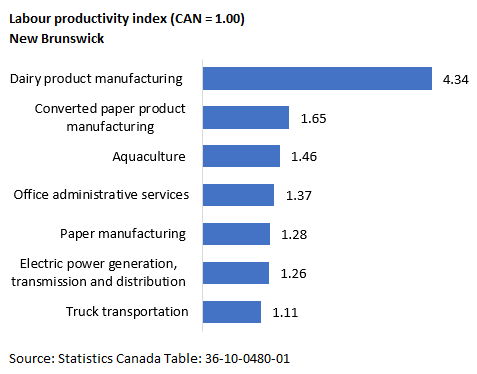There was a ton of good output from Herb Emery’s JDI Roundtable on Manufacturing Competitiveness in New Brunswick. One idea put forward was the concept of an economic ‘lighthouse’. Lighthouse firms already have “robust export focus and highly developed domestic supply chains have higher potential to raise productivity and GDP”. I think this was a McKinsey idea.
We have a romantic notion of the small firm - the entrepreneur who bootstraps an idea to something big - but at some point it morphs into a big corporation preying on its workers, suppliers, and governments. That’s over the top hyperbole but I think you get my point.
Most successful export-focused industries have larger firms that set the pace. Take a look at some of the highest labour productivity sectors in New Brunswick.
I was the first to express concern when the Quebec firms took over the dairy product manufacturing sector but so far - productivity went through the roof and total GDP contribution has been rising. The risk that Quebec-based firms will make decisions not to the benefit of NB is there but so far things have been going well. These are lighthouse firms but they are not based here.
Consider the other sectors with high labour productivity. In each of these cases there is one or two (maybe three) large firms that have the scale to address productivity opportunities. Obviously the NB Power example is a unique case as it is a vertically integrated monopoly (although this would include SJ Energy, etc.) but I put it in there because there has been a significant increase in productivity in that sector over the past decade.
Office administrative services - mostly big firms - paper manufacturing 2 big firms now (maybe 3?). Converted paper products - 1 or 2? This doesn’t preclude smaller firms (although in the case of capital intensive industries that becomes a natural barrier to entry) but it means that there are advantages to scale and having a couple of big lighthouses can end up being good for all the firms in the sector and supply chain.
Labour productivity is not everything and we have to be careful not to compare apples to oranges - i.e. crop farming in NB to Saskatchewan - but it is an important indicator. The other one I love to cite as a counterfactual is the brewery sector. In 2007 there were only 150 people working in the sector in NB (mostly Moosehead and Molson). Total compensation was $84/hour (that includes all wages as well as payroll costs and other benefits). By 2019 there were 400 employed in the sector and total compensation per hour was cut in half. Labour productivity dropped from $303/hour to $94/hour. Why? Because we went from two big capital-intensive players to a couple of dozen or more small breweries and that pushed productivity and wages way down. If you asked most beer drinkers in NB they would strenuously object to going back to the good old high productivity/high wage days.
I’m not suggesting we pursue a monopoly-based approach to economic development but I am suggesting we need to have a few leaders of the pack - lighthouses - to lead the development of a cluster of firms - think Mariner in the NB IT sector.
The implication of this is simple. When we look to develop opportunities - the role of those ‘lighthouses’ needs to be lit up.




A “lighthouse firm” by the McKinsey definition is not necessarily a monopoly— it is a leader in adoption of higher productivity technologies at scale. They are world leaders in automation, AI adoption, etc. The advantage is that they create an eco-system around them that drives other firms in geographical or sector proximity forward.
Unfortunately, in NB, our only lighthouse firms are the ones everyone loves to hate. We have a culture problem in the NB business world and it permeates everything. We think big=bad. You nailed it with the observation that we romanticize small biz. It’s holding us back. We can’t treat big successful firms with suspicion. We need to learn how to leverage their success, technologies, networks and supply chains to make other big biz. Culture change needs to happen, particularly in the civil service and economic development arms of the province.
This was a good book; https://www.google.ca/amp/s/www.nytimes.com/2018/04/30/business/dealbook/review-big-is-beautiful-questions-the-virtues-of-small-business.amp.html
~Mara Mallory